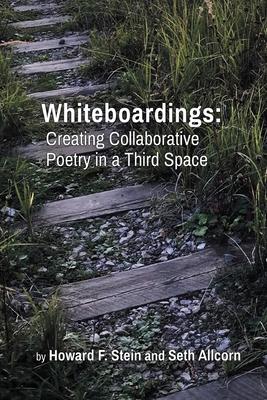I had the pleasure of reading WHITEBOARDINGS, co-authored poetry by Howard F. Stein and Seth Allcorn, over the course of two days, in small bites, letting the poems digest as I entered into a third space between the writers and the words. The last line still rings: "what is real?" What seems real to me now, as the book still settles, is the depth of this third space, what [Donald] Winnicott once called "potential space"- which, unlike anything I've encountered, resounds with both wonder and longing in Stein and Allcorn's co-authored poems. Indeed, what seems little acknowledged, perhaps unconsciously avoided even, in the mountains of clinical writing on potential space, is just how creative a process of mourning can become when shared, through the free association of words, on a socalled "whiteboard." A process where the tragic can be at once refused, revisited, reimagined, and ultimately worked with, instead of merely "worked through." I'm also with a palpable feeling - like something "gone awry" after a summer's day of tubing down a river (see opening poem, "River of Snow"). The authors' words become my own as I ponder whether I can know the river's mysteries. Does it, can it, "flow upward" - an "upward spiral" away from all the "slaughter on the ground' - or is it all an "endless falling without a bottom"? I'm not sure of an answer - nor sure I want one - but I do recognize that the "casket was open" as I read (see "Life of Files"), and I saw what the authors saw there, unflinchingly, and I creatively mourned. But I also touched a strange and perhaps timeless beauty, if only for a brief moment, before the casket was closed and the corpse buried, burned, turned to ash. I had borne witness to the culmination of a sustained potential space, forged from a 30-year friendship between the two authors, that offered not just memories but promises back to us, its readers, in an enduring presence: a true gift. -Nathan Gerard, Ph.D.

Whiteboardings: Creating Collaborative Poetry in a Third Space
I had the pleasure of reading WHITEBOARDINGS, co-authored poetry by Howard F. Stein and Seth Allcorn, over the course of two days, in small bites, letting the poems digest as I entered into a third space between the writers and the words. The last line still rings: "what is real?" What seems real to me now, as the book still settles, is the depth of this third space, what [Donald] Winnicott once called "potential space"- which, unlike anything I've encountered, resounds with both wonder and longing in Stein and Allcorn's co-authored poems. Indeed, what seems little acknowledged, perhaps unconsciously avoided even, in the mountains of clinical writing on potential space, is just how creative a process of mourning can become when shared, through the free association of words, on a socalled "whiteboard." A process where the tragic can be at once refused, revisited, reimagined, and ultimately worked with, instead of merely "worked through." I'm also with a palpable feeling - like something "gone awry" after a summer's day of tubing down a river (see opening poem, "River of Snow"). The authors' words become my own as I ponder whether I can know the river's mysteries. Does it, can it, "flow upward" - an "upward spiral" away from all the "slaughter on the ground' - or is it all an "endless falling without a bottom"? I'm not sure of an answer - nor sure I want one - but I do recognize that the "casket was open" as I read (see "Life of Files"), and I saw what the authors saw there, unflinchingly, and I creatively mourned. But I also touched a strange and perhaps timeless beauty, if only for a brief moment, before the casket was closed and the corpse buried, burned, turned to ash. I had borne witness to the culmination of a sustained potential space, forged from a 30-year friendship between the two authors, that offered not just memories but promises back to us, its readers, in an enduring presence: a true gift. -Nathan Gerard, Ph.D.